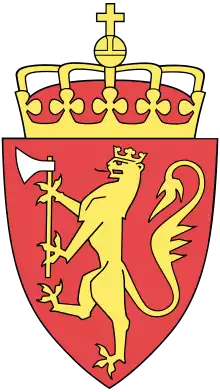Møre og Romsdal
Møre og Romsdal (Urban East Norwegian: [ˈmø̂ːrə ɔ ˈrʊ̀msdɑːl] (![]() listen); English: Møre and Romsdal) is a county in the northernmost part of Western Norway. It borders the counties of Trøndelag, Innlandet, and Vestland. The county administration is located in the town of Molde, while Ålesund is the largest town. The county is governed by the Møre og Romsdal County Municipality which includes an elected county council and a county mayor. The national government is represented by the county governor.
listen); English: Møre and Romsdal) is a county in the northernmost part of Western Norway. It borders the counties of Trøndelag, Innlandet, and Vestland. The county administration is located in the town of Molde, while Ålesund is the largest town. The county is governed by the Møre og Romsdal County Municipality which includes an elected county council and a county mayor. The national government is represented by the county governor.
Møre og Romsdal fylke | |
|---|---|
 Flag 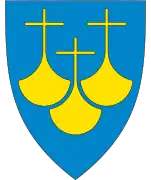 Coat of arms | |
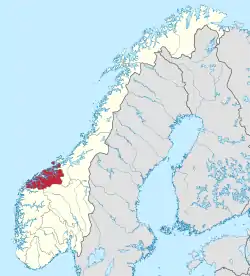 Møre og Romsdal within Norway | |
| Coordinates: 62°30′00″N 07°10′00″E | |
| Country | Norway |
| County | Møre og Romsdal |
| Region | Western Norway |
| County ID | NO-15 |
| Administrative centre | Molde |
| Government | |
| • Governor | Rigmor Brøste (I) (acting) (2019–present) |
| • County mayor | Tove-Lise Torve (Ap) (2011–present) |
| Area | |
| • Total | 14,355.62 km2 (5,542.74 sq mi) |
| • Land | 13,839.80 km2 (5,343.58 sq mi) |
| • Water | 515.82 km2 (199.16 sq mi) |
| Area rank | #9 in Norway, 4.4% of Norway's land area |
| Population (30 September 2019)[2] | |
| • Total | 265,238 |
| • Rank | #9 (4.9% of country) |
| • Density | 18/km2 (48/sq mi) |
| • Change (10 years) | 6.6% |
| Demonym(s) | Møringer or Romsdalinger |
| Time zone | UTC+01:00 (CET) |
| • Summer (DST) | UTC+02:00 (CEST) |
| Official language form | Nynorsk[3] |
| Income (per capita) | 139,200 kr |
| GDP (per capita) | 243,412 kr (2001) |
| GDP national rank | 6 (3.89% of country) |
| Website | www |
Name
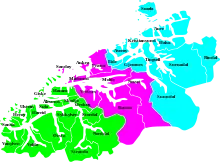
The name Møre og Romsdal was created in 1936. The first element refers to the districts of Nordmøre and Sunnmøre, and the last element refers to Romsdal. Until 1919, the county was called "Romsdalens amt", and from 1919-1935 "Møre fylke".
For hundreds of years (1660-1919), the region was called Romsdalen amt, after the Romsdalen valley in the present-day Rauma Municipality. The Old Norse form of the name was Raumsdalr. The first element is the genitive case of a name Raumr derived from the name of the river Rauma, i.e. "The Dale of Rauma". Raumr may refer to stream or current,[4] or to booming or thundering waterfalls like Sletta waterfall.[5] The name may also refer to Raum the Old, one of the sons of Nór, the eponymous Saga King of Norway. Since the majority of the residents of the county lived in the Sunnmøre region, there was some controversy over the name. In 1919, many of the old county names were changed and this county was renamed Møre fylke.
The name Møre was chosen to represent the region where the majority of the county residents lived. That name is dative of Old Norse: Mǿrr (á Mǿri) and it is probably derived from the word marr referring to something wet like bog (common along the outer coast) or the sea itself. The name is interpreted as "coastland" or "bogland". Møre was originally the name of the coastal area from Stad and north including most of Fosen.[6] (There is also a coastal district in Sweden that has the same name: Möre.) The change in name from Romsdalen to Møre was controversial and it did not sit well with the residents of the Romsdal region. Finally in 1936, the name was changed again to a compromise name: Møre og Romsdal (English: Møre and Romsdal).
The ambiguous designation møring—"person from Møre"—is used strictly about people from Nordmøre (and less frequently for people from Sunnmøre), excluding the people from Romsdal (while, consequently, romsdaling—"person from Romsdal"— is used about the latter).
Coat of arms
The coat of arms was granted on 15 March 1978. It shows three gold-colored Viking ships on a blue background. Shipping and shipbuilding were historically very important to the region, so boats were chosen as the symbol on the arms. The masts on the Viking ships form crosses, which symbolize the strong Christian and religious beliefs as well as the strong religious organisations in the county. There are three boats to represent the three districts of the county: Sunnmøre, Romsdal and Nordmøre.[7]
Geography
Traditionally, the county has been divided into three districts. From north to south, these are Nordmøre, Romsdal, and Sunnmøre. Although the districts do not have separate governments and despite modern road, sea and air connections throughout the county, the three districts still have their own identities in many ways. Historically speaking, connections have been stronger between Nordmøre and Sør-Trøndelag to the north, Romsdal and Oppland to the east, and Sunnmøre and Sogn og Fjordane to the south, than internally. Differences in dialects between the three districts bear clear evidence of this. Due to geographical features, the county has many populated islands and is intersected by several deep fjords. Due to its difficult terrain, Møre og Romsdal has been very dependent on boat traffic, and its main car ferry company, MRF, has existed since 1921.
Settlements
Møre og Romsdal has six settlements with town status. The largest three (Ålesund, Kristiansund, and Molde) were towns long before 1993 when municipalities were given the legal authority to grant town status rather than just the King (and government). This change in law led to an increase in the number of towns (Fosnavåg, Åndalsnes, and Ulsteinvik were all added after this time). The county contains many other urban settlements (as defined by Statistics Norway) without town status, every municipality except for Halsa and Smøla contain at least one. As of 1 January 2018, there were 192,331 people (about 72 percent of the population) living in densely populated areas in the county while only 73,946 people lived in sparsely populated areas.[8] The population density is highest near the coast, with all of the county's towns located on saltwater.
The largest town in the county is Ålesund, with a population of 52,626 in the agglomeration which it forms together with parts of Sula.
| Rank | Town/Urban Area | Municipality | Region | Population (2018)[9] |
|---|---|---|---|---|
| 1 | Ålesund | Ålesund, Sula | Sunnmøre | 52,626 |
| 2 | Molde | Molde | Romsdal | 20,957 |
| 3 | Kristiansund | Kristiansund | Nordmøre | 18,292 |
| 4 | Ørsta | Ørsta | Sunnmøre | 7,308 |
| 5 | Volda | Volda | Sunnmøre | 6,433 |
| 6 | Ulsteinvik | Ulstein | Sunnmøre | 5,788 |
| 7 | Aure | Sykkylven | Sunnmøre | 4,330 |
| 8 | Nordstrand | Giske | Sunnmøre | 4,134 |
| 9 | Sunndalsøra | Sunndal | Nordmøre | 4,054 |
| 10 | Fosnavåg | Herøy | Sunnmøre | 3,621 |
Municipalities
Møre og Romsdal has a total of 26 municipalities.[10][11]
| Municipal Number | Name | Adm. Centre | Location in the county | Established | Includes (former municipalities) |
|---|---|---|---|---|---|
| 1505 | Kristiansund |  | 1 Jan 2008 | 1554 Bremsnes (part) 1555 Grip 1556 Frei | |
| 1506 | Molde | 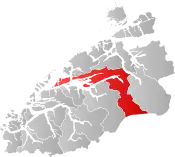 | 1 Jan 2020 | 1542 Eresfjord og Vistdal 1543 Nesset 1544 Bolsøy 1545 Midsund 1545 Sør-Aukra | |
| 1507 | Ålesund | 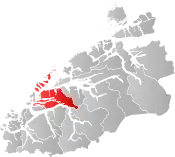 | 1 Jan 2020 | 1523 Ørskog 1529 Skodje 1530 Vatne 1531 Borgund 1534 Haram 1546 Sandøy (part) | |
| 1511 | Fiskåbygd |  | 1 Jan 1838 | 1512 Syvde 1513 Rovde (part) | |
| 1514 | Larsnes |  | 1 Jan 1867 | 1513 Rovde (part) | |
| 1515 | Fosnavåg | 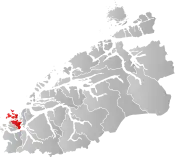 | 1 Jan 1838 | ||
| 1516 | Ulsteinvik |  | 1 Jan 1838 | ||
| 1517 | Hareid |  | 1 Jan 1917 | ||
| 1520 | Ørsta |  | 1 Aug 1883 | 1521 Vartdal 1522 Hjørundfjord | |
| 1525 | Stranda | 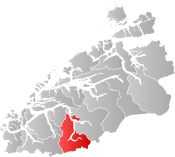 | 1 Jan 1838 | 1523 Sunnylven | |
| 1528 | Aure |  | 1 Aug 1883 | ||
| 1531 | Langevåg |  | 1 Jan 1977 | ||
| 1532 | Valderhaugstrand | 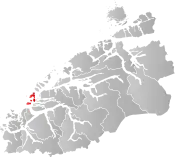 | 1 Jan 1908 | 1533 Vigra | |
| 1535 | Vestnes |  | 1 Jan 1838 | 1536 Tresfjord | |
| 1539 | Åndalsnes | 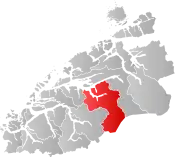 | 1 Jan 1964 | 1537 Voll 1537 Eid og Voll 1538 Eid 1539 Grytten 1540 Hen 1541 Veøy (part) | |
| 1547 | Falkhytta |  | 1 Jan 1838 | 1546 Sandøy (part) | |
| 1554 | Bruhagen |  | 1 Jan 1964 | 1552 Kornstad 1553 Kvernes 1554 Bremsnes | |
| 1557 | Batnfjordsøra | 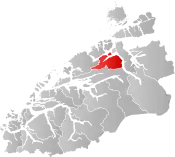 | 1 Sep 1893 | 1553 Kvernes (part) 1558 Øre | |
| 1560 | Tingvollvågen | 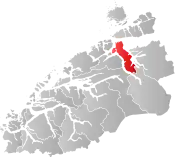 | 1 Jan 1838 | 1559 Straumsnes 1564 Stangvik (part) | |
| 1563 | Sunndalsøra |  | 1 Jan 1838 | 1561 Øksendal 1562 Ålvundeid 1564 Stangvik (part) | |
| 1566 | Skei |  | 1 Jan 1838 | 1564 Stangvik (part) 1565 Åsskard | |
| 1573 | Hopen |  | 1 Jan 1960 | 1573 Edøy 1574 Brattvær 1575 Hopen | |
| 1576 | Aure |  | 1 Jan 1838 | 1568 Stemshaug 1570 Valsøyfjord 1572 Tustna | |
| 1577 | Volda |  | 1 Jan 1838 | 1444 Hornindal 1518 Dalsfjord | |
| 1578 | Stordal |  | 1 Jan 2020 | 1524 Norddal 1526 Stordal | |
| 1579 | Elnesvågen |  | 1 Jan 2020 | 1548 Fræna 1549 Bud 1550 Hustad 1551 Eide |
Infrastructure
Møre og Romsdal is served by nine airports, of which only the four airports located near the four largest centres have regular domestic flights. The largest airport in the county is Ålesund Airport, Vigra, which offers the only scheduled international routes from any airport in Møre og Romsdal. Ålesund Airport had 732,614 passengers in 2006. Kristiansund Airport, Kvernberget, had 364,350 passengers in 2007, while Molde Airport, Årø, had 401,292, down from 444,677 in 2006. Ørsta–Volda Airport, Hovden, had 49,842 passengers in 2006. None of the airports in Møre og Romsdal offer regular flights to each other.[14]
In 2007, Møre og Romsdal had 6,339 kilometres (3,939 mi) of public roads, an increase of 5 kilometres (3.1 mi) since the previous year, as well as 4,258 kilometres (2,646 mi) of private roads, 7 kilometres (4.3 mi) more than in 2006.[15]
There is one railway, the Rauma Line, which starts at Åndalsnes and connects to the main railway network of Norway. Public buses are operated by the county, using the brand name Fram.
History
| Year | Pop. | ±% |
|---|---|---|
| 1951 | 191,621 | — |
| 1961 | 213,286 | +11.3% |
| 1971 | 223,709 | +4.9% |
| 1981 | 236,062 | +5.5% |
| 1991 | 238,278 | +0.9% |
| 2001 | 243,810 | +2.3% |
| 2011 | 253,904 | +4.1% |
| 2021? | 282,661 | +11.3% |
| 2031? | 303,810 | +7.5% |
| Source: Statistics Norway.[16] | ||
The county (with its current borders) was established in 1671 - but after just four years (in 1675) it was divided into two amts (counties): Romsdal (which included Nordmøre) and Sunnmøre (which included Nordfjord). In 1680 (only 5 years later), Sunnmøre (including Nordfjord) was merged into Bergenhus amt. Then in 1689 (another 9 years later), the three regions of Romsdal, Sunnmøre and Nordmøre were again merged into one amt/county: Romsdalen. Then in 1701 (another 11 years later) Romsdalen amt was split and divided between Trondhjems amt (which got Romsdal and Nordmøre) and Bergenhus amt (which got Sunnmøre). In 1704 (a mere 4 years later), the three regions of Romsdal, Sunnmøre and Nordmøre were again merged into one county. The borders of the county have not been changed much since 1704. The annex parish of Vinje within the larger Hemne parish was transferred from Romsdalens amt to Søndre Trondhjems amt in 1838 (according to the 1838 Formannskapsdistrikt law, a parish could no longer be divided between two counties, so Vinje had to be in the same county as the rest of the parish). On 1 January 2019, the municipality of Rindal was transferred from Møre og Romsdal county to the neighboring Trøndelag county. On 1 January 2020, the municipality of Halsa will become part of the new municipality of Heim in Trøndelag county.
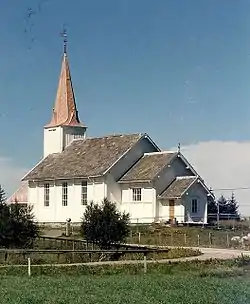
In 2019, archaeologists from the Norwegian Institute for Cultural Heritage Research, using large-scale high-resolution georadar technology, determined that a 17 meter long Viking ship was buried on the island of Edøya near Edøy Church. They estimate the ship's age as over 1,000 years: from the Merovingian or Viking period; the group planned to conduct additional searches in the area. A similar burial was found previously by a NIKU team in 2018, in Gjellestad.[17]
Parishes
- Aukra (Akerø)
- Aure
- Austefjord
- Bergmo
- Bjørke
- Bolsøy
- Borgund
- Brattvåg
- Brattvær
- Bremsnes
- Bud (Boe)
- Dalsfjord
- Edøy
- Old Edøy
- Eid
- Eide
- Eikesdal
- Ellingsøy
- Eresfjord
- Fiksdal
- Fjørtoft
- Frei (Fredøe)
- Fræna
- Geiranger
- Giske
- Gjemnes
- Gjøra
- Godøy
- Grip
- Grytten
- Gullstein
- Gursken
- Halsa
- Hamnsund
- Haram
- Hareid
- Harøy
- Hen
- Herøy
- Hildre
- Hjørundfjord
- Hof
- Holm
- Hopen
- Hov
- Hustad
- Ikornnes
- Indre Fræna
- Indre Herøy
- Indre Sula
- Kilsfjord
- Kirkelandet
- Kleive
- Kornstad
- Kors
- Kristiansund
- Kvernes
- Kvernes Stave
- Langevåg
- Larsnes
- Leikanger
- Liabygda
- Mo
- Molde
- Myrbostad
- Nesset
- Nord Aukra
- Nord-Heggdal
- Nordbyen
- Norddal
- Nordlandet
- Otrøy
- Otterøy
- Ranes (Skei)
- Rindal
- Roald
- Romfo
- Rovde
- Røbekk
- Rød
- Rødven
- Rødven Stave
- Røvik
- Saint Jetmund
- Sande
- Sandøy
- Sekken
- Sira Church (Nesset)
- Skarbøvik
- Skei
- Skodje
- Smøla
- Spjelkavik
- Stangvik
- Stemshaug
- Old Stordal
- Stordal
- Stranda
- Straumsnes
- Sunndal
- Sunnylven
- Surnadal (Surendal)
- Sykkylven
- Sylte
- Syvde
- Sør Aukra
- Sør-Tustna
- Tingvoll
- Todalen
- Tresfjord
- Tustna
- Ulstein
- Valderøy
- Valsøyfjord
- Vanylven
- Vartdal
- Vatne
- Vestnes
- Veøy
- Old Veøy
- Vigra
- Vike
- Vistdal
- Volda
- Voll
- Volsdalen
- Vågstranda
- Vågøy
- Ytre Fræna
- Øksendal
- Øre
- Ørskog
- Ørsta
- Øverdalen
- Øvre Rindal
- Øye
- Ålesund
- Ålvundeid
- Åram
- Åsskard
- Kristiansund Branch (LDS, 1904-1923)
- Ålesund Branch (LDS, early-1923)
Villages
- Alnes
- Angvik
- Aukrasanden
- Aure, Aure
- Aure, Sykkylven
- Austnes
- Batnfjordsøra
- Boggestranda
- Brandal
- Brattvåg
- Bremsnes
- Bruhagen
- Bud
- Dravlaus
- Dyrkorn
- Eggesbønes
- Eide
- Eidsbygda
- Eidsdal
- Eidsvik
- Eidsvåg
- Eikesdalen
- Eiksund
- Elnesvågen
- Eresfjord
- Fiksdal
- Fiskåbygd
- Flemma
- Flåskjer
- Fyrde
- Geiranger
- Gjemnes
- Gjøra
- Glærem
- Grip
- Grøa
- Gullstein
- Gursken
- Haddal
- Halsanaustan
- Hareid
- Hausbygda
- Heggem
- Helle
- Hellesylt
- Helsem
- Hjelset
- Hjørungavåg
- Hoelsand
- Hoffland
- Hollingen
- Hopen
- Hovland
- Hustad
- Ikornnes
- Innfjorden
- Isfjorden
- Jordalsgrenda
- Kleive
- Kornstad
- Kvalsund
- Kvernes
- Kårvåg
- Langevåg
- Larsnes
- Langøy
- Leikong
- Leira
- Leitebakk
- Liabygda
- Liabøen
- Longva
- Løvika
- Malme
- Malmefjorden
- Mauseidvåg
- Midsund
- Mittet
- Mo
- Myklebost, Sandøy
- Myklebost, Vanylven
- Myklebostad
- Myklebost
- Måndalen
- Nedre Frei
- Nesjestranda
- Nord-Heggdal
- Norddal
- Nordstrand
- Ona
- Rausand
- Rensvik
- Roald
- Romfo
- Rovdane
- Råket
- Røbekk
- Rødven
- Røssøyvågen
- Røvika
- Sande
- Sjøholt
- Skei
- Skodje
- Slagnes
- Spjelkavik
- Stangvik
- Steinshamn
- Stemshaug
- Stordal
- Store Standal
- Stranda
- Straumgjerde
- Straumshamn
- Sunndalsøra
- Surnadalsøra
- Sylte, Fræna
- Sylte, Norddal
- Sylte, Surnadal
- Syvde
- Sølsnes
- Søvik
- Sæbø
- Sætre
- Tafjord
- Tennfjord
- Tingvollvågen
- Todalen
- Todalsøra
- Tomrefjord
- Tornes
- Torvikbukt
- Tresfjord
- Tusvik
- Tømmervåg
- Valle
- Valsøybotnen
- Valsøyfjord
- Varhaugvika
- Vatne
- Veblungsnes
- Veiholmen
- Verma
- Vestnes
- Vevang
- Vik
- Vikebukt
- Visnes
- Vistdal
- Volda
- Voll
- Vågstranda
- Øksendalsøra
- Øre
- Ørsta
- Åfarnes
- Åheim
- Ålvund
- Ålvundeidet
- Åram
- Årset
- Åsskard
Former Municipalities
- Bolsøy
- Borgund
- Brattvær
- Bremsnes
- Bud
- Dalsfjord
- Edøy
- Eid
- Eid og Voll
- Eide
- Eresfjord og Vistdal
- Frei
- Fræna
- Grip
- Grytten
- Halsa
- Haram
- Hen
- Hjørundfjord
- Hopen
- Hustad
- Kornstad
- Kvernes
- Midsund
- Nesset
- Norddal
- Rovde
- Sandøy
- Skodje
- Stangvik
- Stemshaug
- Stordal
- Straumsnes
- Sunnylven
- Syvde
- Sør-Aukra
- Tresfjord
- Tustna
- Valsøyfjord
- Vartdal
- Vatne
- Veøy
- Vigra
- Voll
- Øksendal
- Øre
- Ørskog
- Ålvundeid
- Åsskard
See also
References
- Statistisk sentralbyrå (2020). "09280: Area of land and fresh water (km²) (M)" (in Norwegian).
- Statistisk sentralbyrå (2020). "Table: 06913: Population 1 January and population changes during the calendar year (M)" (in Norwegian).
- "Møre og Romsdal".
- Norske stedsnavn/stadnamn. Oslo: Grøndahl. 1975. p. 72. ISBN 8250401042.
- Norsk allkunnebok. Oslo: Fonna. 1959.
- Norske stedsnavn/stadnamn. Oslo: Grøndahl. 1975. p. 71. ISBN 8250401042.
- "Civic heraldry of Norway - Norske Kommunevåpen". Heraldry of the World. Retrieved 24 March 2019.
- "Population in densely and sparsely populated areas. County. 1. January" (in Norwegian). Statistics Norway. 2018. Retrieved 24 March 2019.
- Statistisk sentralbyrå (1 January 2018). "Urban settlements. Population and area, by municipality".
- List of Norwegian municipality numbers
- PDF attachment to letter sent to the municipalities on October 27, 2017 from det Kongelige Kommunal og Moderniserings Department referencing Nye kommune- og fylkesnummer fra 1. januar 2020 (Norwegian)
- Statistics Norway - Church of Norway. Archived 2012-07-16 at Archive.today
- Statistics Norway - Members of religious and life stance communities outside the Church of Norway, by religion/life stance. County. 2006-2010
- "Avinor.no". Archived from the original on 11 March 2008. Retrieved 10 June 2008.
- "Statistikkbanken" (in Norwegian). Statistics Norway. 2007. Archived from the original on 23 February 2013. Retrieved 11 June 2008.
- Projected population - Statistics Norway
- "Ancient Viking ship discovered buried next to church using breakthrough georadar technology". The Independent. 27 November 2019. Retrieved 27 November 2019.
This will certainly be of great historical significance, archaeologists say
External links
- Møre og Romsdal county
 Media related to Møre og Romsdal at Wikimedia Commons
Media related to Møre og Romsdal at Wikimedia Commons Møre og Romsdal travel guide from Wikivoyage
Møre og Romsdal travel guide from Wikivoyage
